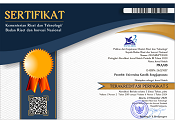Uji Determinan Motivasi Wanita Berwirusaha: Studi Empiris Pada Mahasiswi Di Kabupaten Klaten
Abstract
This study aims to test the model whether attitude towards, subjective norms, perceived behavior control in the theory of Planned Behavior have a positive influence on entrepreneurial intentions and behaviors of private university female students in Klaten Regency. The research design was carried out using a quantitative method which explains the causal relationship between one dependent variable which is influenced by three independent variables and one mediating variable. Hypothesis testing is formulated in the model using the multivariate test. The population in the research were all university students in the Klaten Regency area who had started the initial ultra-micro business. The sampling technique was carried out by purposive sampling as many as 180 respondents of female students as initial business actors.
The final result of the quantitative model test using Structural Equation Modeling (SEM) shows that there is a positive influence on attitude towards entrepreneurship and perceived behavior control on entrepreneurial intentions and behaviors. Meanwhile, one variable in the form of subjective norms does not significantly influence it. Future research can expand the model through testing the antecedents of intention to behavior by developing research designs through experimental research.
Keywords
Full Text:
PDF (Bahasa Indonesia)References
Ajzen, I. (1991). The Theory of Planned behavior , Organizational behavior and human decision process pp 179-211 Amhest, MA: Elsevier
Andika, M., Madjid, I. (2012) Analisis Pengaruh Sikap Norma subyektif dan Efikasi Diri Terhadap Intensi Berwirausaha pada Mahasiswa Fakultas Ekonomi Unsyiah. Eco-entrepreneurship Seminar dan Call for Paper,Semarang: FE Unnes, hal 190-197
Austhi, D (2017). Motivasi berwirausaha dan Kesuksesan berwirausaha Pada Wirausahawan Wanita Anne Avanite, Agora, Vol 5 (1), hal 1-8
Chrismardani, Y. (2016). Theory Planned behavior sebagai Prediktor Intensi Wirausaha. Kompetensi, Vol 10 (1), hal 90 -103
Dwijayanti, Renny. (2012). Pengaruh Noma Subyektif, Sikap Wirausaha dan Efikasi Diri terhadap Intensi Berwirausaha Mahasiswa, Tesis, Malang: Univ Negeri Malang
Fennech, R., Ivanov, D. (2019). Entrepreurial Attitudes, self Eficcacy and Subjective Norms Amongs Female Emirati Entrepreneurs. International Journal of entrepreneurship, vol 23(1), pp 1-11
Ferdinand, A. (2000) Structural Equation Modelling dalam Penelitian Manajemen, aplikasi Model –model Rumit dalam Penelitian untuk Tesis dan Disertasi, Semarang: Badan Penerbit Universitas Diponegoro
Fishbein, M., Ajzen , I. (1975). Belief, Attitude, Intention and Behavior: An Introduction to Theory and Research, Reading, MA: Addison-Wesley
Islami, N.N. (2015). Pengaruh Sikap kewirausahaan, Norma Subyektif dan Efikasi Diri terhadap Perilaku Berwirausaha melalui Intensi Berwirausaha Mahasiswa. Jurnal Ekonomi Pendidikan dan Kewirausahaan, Vol 3(1), hal 5-21
Kasim, R.S.R., Awang, A., Hashim, Z. (2013). Innovative and Sustainable Governance Model of Rural transformation Center in agribusiness Project: a Conceptual Paper. Procedia-Social and Behavior Science, Vol 107, pp 67-71
Kipnis, H. (2020). Covid-19 and Gender Equality: Six Actions for The Privates Sector. IFC Guidance Note, IFC/ World Bank Grup
Lee, Jean (1996). The Motivation of woman Entrepreneurs in Singapore. Journal of Smmall business in Management, Breat Britain
Noviani, N.A. (2007) Motivasi menjadi Pegawai Negeri sipil pada WNI Keturunan India. Skripsi, Semarang: Perpustakaan Fakultas Psikologi
Nugroho, A.J., Nursito, S, Haris, A. (2015) pengembangan Model Budaya Wirausaha Berbasis Nilai-nilai Kewirausahaan islami dan Kearifan Budaya Lokal. Majalah Ilmiah, Vol 14 (2) , hal 125-137
Ramayah, T dan Harun, Z (2005) Entrepreneurial Intention Among the Studentof Universiti Sains malaysia, International Journal of Management and Entrepreneurship, Vol 1 pp 8-20
Razak, K.A., (2017) Islamic Entrepreneurship Model.International Muamalat and Entrepreneurship Confrence, 1-22
DOI: https://doi.org/10.24167/praxis.v4i1.3282
View My Stats | ISSN 2622-9137 (media online)







